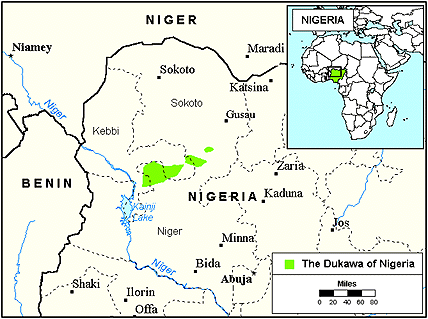Located in the Yauri division of the Sokoto Province and also in the Yelwa division of the Kontagora Province are the Dukawa people of Nigeria. The Dukawa language is part of the Benue-Congo branch of the Niger-Congo language family and they are closely related to the Kambari people due to their similar language. They can be found in parts of Niger and Kebbi states.
Read more about Discover Nigeria
The Dukawa is referred to as a fine race. Their men have an average height of just under six feet and the women have strong healthy physiques from carrying heavy loads on their shoulders. They are intelligent people with a good knowledge of medicine. In 1968 however, many Dukawa people have forced off their homeland and resettled due to the completion of the Kainji Dam Project. These new, larger settlements provide government schools, jobs, and hospitals for the Dukawa, whose culture is becoming increasingly more modernised.
Socio-Cultural Characteristics
The Dukawa have a history of being great fighters–bows and poisoned arrows were their principal weapons. Successful hunters and warriors wore black shirts and bracelets made of the skins of their victims. Hunting continues to be an important cultural aspect of Dukawa life. Arrows are sometimes fired out of guns, especially when hunting elephants.
The geographical terrain of the Dukawa homeland is hilly and rocky, with rivers being the source of their consumable fish. The soil near most of the rivers is also very fertile in nature for the cultivation of crops. Thus, their mainstay for livelihood is fishing and farming. The major crop they produce includes millet and guinea corn in the highlands and onions along the rivers. Other crops include maize, peanuts, sweet potatoes, and beans. The Dukawa grow their own tobacco, and many of them enjoy smoking. Town dwellers also have large farms in the bush where they live for part of the year.
Sign up to the Connect Nigeria daily newsletter
Many defensive towns still remain in the Dukawa region; surrounded by strong, high walls with holes in them for guns and arrows. Deep moats surround the walls, outside which is another trench with low walls and prickly thorns. Some Dukawa lives in small rural villages outside these towns. Their homes are small huts with walls only four feet high and containing mud beds, beneath which a fire burns.
Maturity And Marriage
Unlike most tribes in Nigeria, circumcision is not a common practice among Dukawa. Instead, a boy’s journey into manhood begins when he is able to wrestle. At that time, his father will give him cloth and some land to farm for the next seven years, until he is ready to marry. Girls and boys have an opportunity to meet at the wrestling matches, and a girl is given flour to sprinkle over the head of the boy she chooses. All of these Dukawa cultural traits still exist. However, in recent years, increasing numbers of Dukawa have begun assimilating into a more modern, commercialised society.
Religious Beliefs
Most Dukawa believe in witchcraft and many gods. They are also animists (believe that non-living objects have spirits), and they worship and sacrifice various inanimate objects. Medicines and oaths also play a role in Dukawa beliefs. The majority of the Dukawa therefore, practice ethnic religions. They believe that at death they will join their dead ancestors. They believe in and often claim to see ghosts walking about at night. The ghosts are said to have fire coming forth from their armpits and are known to beat people to death.
Traditionally, brass rings are still worn in most women’s lips, and ear ornaments are made of red stone or red silk.
Sources:
Joshua Project
101lasttribes
Featured Image Source: Joshua Project
Got a suggestion? Contact us: [email protected]

